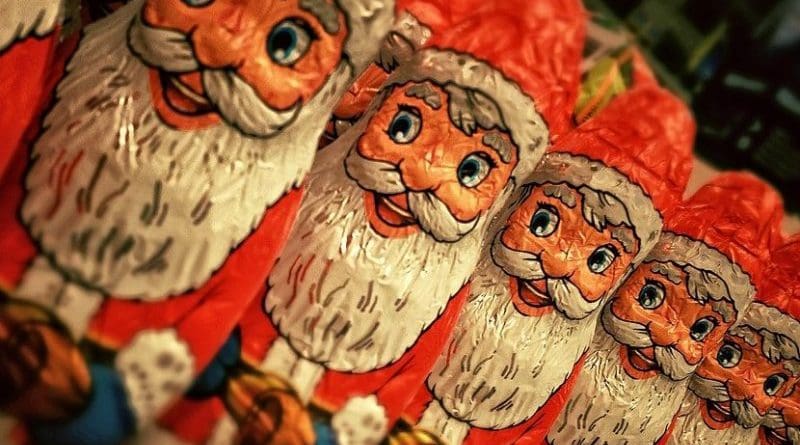China Bans Christmas In Parts Of Country, Santa Included
By UCA News
As Christmas approaches, officials in China have requested strict controls on festive celebrations as the country continues its crackdown on religions at the end of a year that has seen stepped-up persecution of Christians.
Shops and street vendors alike are reportedly being banned from selling wares considered “controversial” by the state in various parts of the country.
Meanwhile, some underground churches — including those organized at people’s homes, and others not sanctioned by the officially atheist, communist government — have been warned not to hold any gatherings.
A notice issued by the Urban Management Bureau in Langfang city of Hebei province in northern China on Dec. 15 that was circulated online requires all local law enforcement agencies to “comprehensively ban all Christmas items such as Christmas trees and Santa Claus placed along the street.”
Moreover, they have been instructed to “clear away all Christmas stickers, banners, signs, light-box advertisements and other related promotional items.”
Christmas-themed performances and other “religious propaganda activities” have also been strictly forbidden at public areas like parks and malls. If any are detected, they must be “closely monitored and reported in a timely manner,” the edict states.
In addition to schools, parks, malls, supermarkets and commercial districts, local authorities must also closely monitor vendors, who can be prosecuted if found selling Christmas trees, Christmas apples or images of Santa.
Christmas has been slowly gaining in popularity among young Chinese despite it lacking a public holiday or the cultural roots that make it such a big deal in Western countries. Reports last year claimed Christmas apples were proving a hit among the food-loving Chinese public, causing their prices to soar.
The state-run Global Times even cited one student in Chongqing who sold over 4,000 to his schoolmates in just two weeks.
Some critics suggested their sales were partly a result of China’s love of Apple products like the iPhone. Others say it relates to tradition: the Chinese refer to Christmas Eve is ping’an ye, which means a safe and peaceful night; this is similar to the Chinese word for apple, pingguo.
But the social and political landscape appears to have become less Christmas friendly this winter.
“All law enforcement agencies should attach great importance to [this warning] and strictly follow the requirements,” the notice read. “During the festival, especially on Dec. 23, 24 and 25, all agencies must remain vigilant and alert, and carry out intensive inspections to ensure a clean city environment,” it continued.
A bureau employee, who declined to give his name, told the Global Times on Dec. 17 “the action is not targeted at Christmas, but is part of local authorities’ efforts to [ensure places like Langfang] get rated as a ‘national civilized city’ [by the state].”
According to the report, the award is presented every three years to honor those cities that can boast of a strong economy, good social development, impressive new infrastructure, and outstanding public services. The employee said managing roadside stalls and migrant vendors was a routine affair, especially over Christmas when illegal sales proliferate.
The report quoted a professor at China University of Political Science and Law as saying that urban management bureaus’ main goal was to better regulate retailers rather than outlaw Christmas altogether.
Some Catholics interviewed by ucanews.com suggested the crackdown in Langfang was drawing such concern and public ire that “we suspect the authorities may be forced to change their tone.”
That being said, some social groups are showing the government their support. A video that went viral recently shows a group of elderly women in military-style camouflage clothing on the streets of Huaihua city in Hunan province in central China scolding a shopkeeper for having Christmas decorations. One of the women is shown reading a statement proclaiming Christmas as “the birthday of an old foreign man” (Jesus).
She also associates the festival with the Eight-Nation Alliance – a military coalition that was set up in response to China’s Boxer Rebellion – suggesting those who celebrate Christmas are effectively condoning the past “slaughter” of their countrymen.
“Why should we celebrate his birthday as he never benefited the Chinese?” she asks in the video, which has taken flak even from the Chinese public.
One parishioner at a church in Hebei, who gave his name as Paul, told ucanews.com the state has been using Christmas to stir up love of the motherland.
“I heard some places are now allowing Christmas trees be placed there in the name of patriotism,” he said.
A priest in northeastern China, who declined to give his name, said many underground churches had received notices to cancel their Christmas Mass, as well as related services and activities, or face the consequences. He had not received any such warning but said he would have no choice but to obey one should it come.

